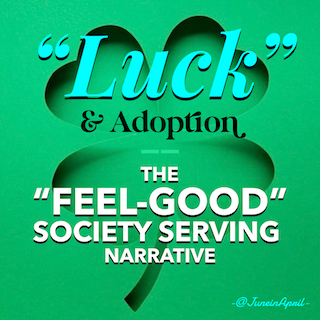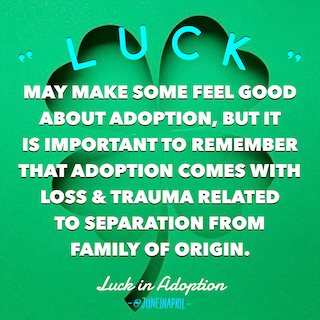Luck and Adoption: The “Feel-Good” Society-Serving Narrative
Luck is an idea that can compel us in different ways if, of course, you buy into its magical notion. Some people pay it no mind while others swear by their lucky socks, lucky numbers and other trinkets that they believe can bring good fortune. Often, luck can be a concept that may offer some solace, especially when confronted with aspects of life that can feel beyond our control.
Determining a lucky or unlucky circumstance is largely subjective. In adoption, the idea of luck has long been entered into the conversation in ways that can leave adopted people feeling different ways, particularly when they are young. Some may experience confusion or even resentment that they should feel ‘lucky’ to be adopted. Others, particularly young people who have been separated from family of origin due to abuse and/or neglect and as a result spent time in different foster care placements, may indeed consider their adoption a stroke of good fortune.
The important thing for adults to remember is that children and young people can and often do feel many ways about family separation and adoption. These feelings can and do fluctuate over time, particularly as young people grow and develop their individual identity connected to their unique family experiences. Luck may make adults feel good about adoption, but it is important to remember that adoption does come with loss and trauma related to separation from family of origin regardless of the reason. In this way, deeming adoption ‘lucky’ may leave the adopted person feeling as though their myriad feelings are minimized into a “feel-good” narrative that serves adults and society at large.
Here are three important ways to honor the complexities of family separation and adoption to ensure a pathway of healthy and whole identity development.
1. Luck can be a fun and magical idea however inserting it into the adoption narrative can be harmful to all members of the extended family of adoption. Because of the loss and trauma that is an aspect of the adoption experience in different ways for many adopted people, depicting adoption as an example of good luck can feel dismissive of its complexities. The reality is, adoption occurs because of specific circumstances in the lives of adults. The circumstances that lead to adoption can be vast and complicated. When we offer children or youth age appropriate yet truthful information about the reasons for adoption, it allows them to mature into adults that have a healthy and realistic understanding about themselves and all of their family systems.
2. Often it is individuals not connected to adoption that will offer the idea that the adopted person is ‘so lucky’ simply to have been adopted by “a good family”. Over the years of connecting to thousands of adopted persons, so many of us have heard this at some point in their life if not once, many times. Some children can internalize the concept of luck and adoption and feel as though they must always remember to be grateful for what everyone is supposed to have, the love and stability of family. It is my belief that children deserve loving, safe and stable families as a matter of human rights. It really shouldn’t come down to a stroke of luck. One thing parents and caregivers tend to do is to reframe the conversation for others by pointing out that they as adults feel fortunate to have known the joys of parenthood through adoption. Yet, even that, sets the adopting parents up to have to be perfect caregivers and the parents of origin to be only grateful for their child being cared for elsewhere. It is useful to educate people that adoption is a complicated process, and not something that should occur on a whim for anyone involved. Reframing the “lucky to be adopted” narrative can validate an adopted person's need to communicate their many different feelings about adoption and take the pressure off of a child to always have to feel grateful for what everyone is supposed to have, a loving and safe family.
3. Since we want to remember to always validate the feelings and perspectives of the adopted person, for those who may consider the permanence of adoption a stroke of fortune in their lives it is important not to be dismissive of this perspective. Often this may be a sentiment expressed by older youth who may have spent time in one or more foster homes. When love and stability comes after this experience, it is understandable how a young person may consider this ‘lucky’ or at least ‘luckier’ than what they have known in the past. What is always necessary though is to remind the adopted person that they are entitled to feel however they wish about their experience but that they need not feel grateful simply for having come into a different family. Validate that all children deserve love and stability as a matter of human rights. Offer positive affirmations about a child’s biological and original roots and remind children that your love for them will remain steadfast no matter how they feel about being adopted, even if these feelings fluctuate over time.
Luck, and what we consider to be lucky, is always about perspective. Painting the adoption experience with a broad stroke of luck can often overshadow the deeper complexities of this experience. Educating people around you about the different perceptions on luck and adoption is an important way to support adopted people. Reminding adopted people that they have a right to their different and changing feelings about adoption (and anything else for that matter) and that this will not change your love or care for them is another essential step in supporting adopted persons of any age or stage. When adopted people are raised with healthy and realistic narratives about their experiences, and when their different feelings are lovingly validated, we can best support adopted people in developing a healthy personal and family identity. In this way we can show people faced with family separation, trauma, loss, and grief the profound blessing that they truly are.


